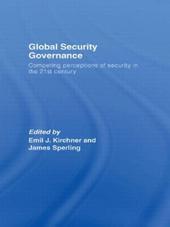
|
Global Security Governance: Competing Perceptions of Security in the 21st Century
Paperback
Main Details
| Title |
Global Security Governance: Competing Perceptions of Security in the 21st Century
|
| Authors and Contributors |
Edited by Emil J. Kirchner
|
|
Edited by James Sperling
|
| Physical Properties |
| Format:Paperback | | Pages:312 | | Dimensions(mm): Height 234,Width 156 |
|
| ISBN/Barcode |
9780415391627
|
| Classifications | Dewey:327.17 |
|---|
| Audience | | Undergraduate | | Postgraduate, Research & Scholarly | | Professional & Vocational | |
|---|
| Edition |
New edition
|
| Illustrations |
70 black & white tables
|
|
Publishing Details |
| Publisher |
Taylor & Francis Ltd
|
| Imprint |
Routledge
|
| Publication Date |
15 August 2006 |
| Publication Country |
United Kingdom
|
Description
This book demarcates the barriers and pathways to major power security cooperation and provides an empirical analysis of threat perception among the world's major powers. Divided into three parts, Emil Kirchner and James Sperling use a common analytical framework for the changing security agenda in Canada, France, Germany, Italy, Japan, the Russian Federation, the United States, the United Kingdom, and the EU. Each chapter features: an examination of national 'exceptionalism' that accounts for foreign and security policy idiosyncrasies definitions of the range of threats preoccupying the government, foreign policy elites and the public assessments of the institutional and instrumental preferences shaping national security policies investigations on the allocation of resources between the various categories of security expenditure details on the elements of the national security culture and its consequences for security cooperation. Global Security Governance combines a coherent theoretical framework with strong comparative case studies, making it ideal reading for all students of security studies.
Author Biography
University of Essex, UK University of Akron, USA
Reviews'Global Security Governance is a distinct contribution to our understanding of international security cooperation in the contemporary world. Using a common framework, 12 excellent surveys examine national perceptions of security threats, institutional and instrumental preferences over policy, and the allocation of security resources. Integrating these essays, the editors insightfully probe the potentials and pitfalls for global and regional security governance. This thoughtful volume will be of interest to scholars of international relations and policy makers alike.' - David A. Lake, University of California, USA 'Global Security Governance makes an important and timely contribution to the ongoing debate about the nature and scope of security in the 21st century. The individual country-study chapters, disciplined by a common grid, represent an exemplary example of comparative foreign policy analysis. This empirically grounded and theoretically informed collection deserves a wide readership among practitioners and scholars alike.' - Antonio Missiroli, European Policy Centre, Brussels 'This book contributes a most valuable novel approach to security studies and significantly adds to our knowledge of contemporary security threats.' - Knud Erik Jorgensen, Arhus University, Denmark
|